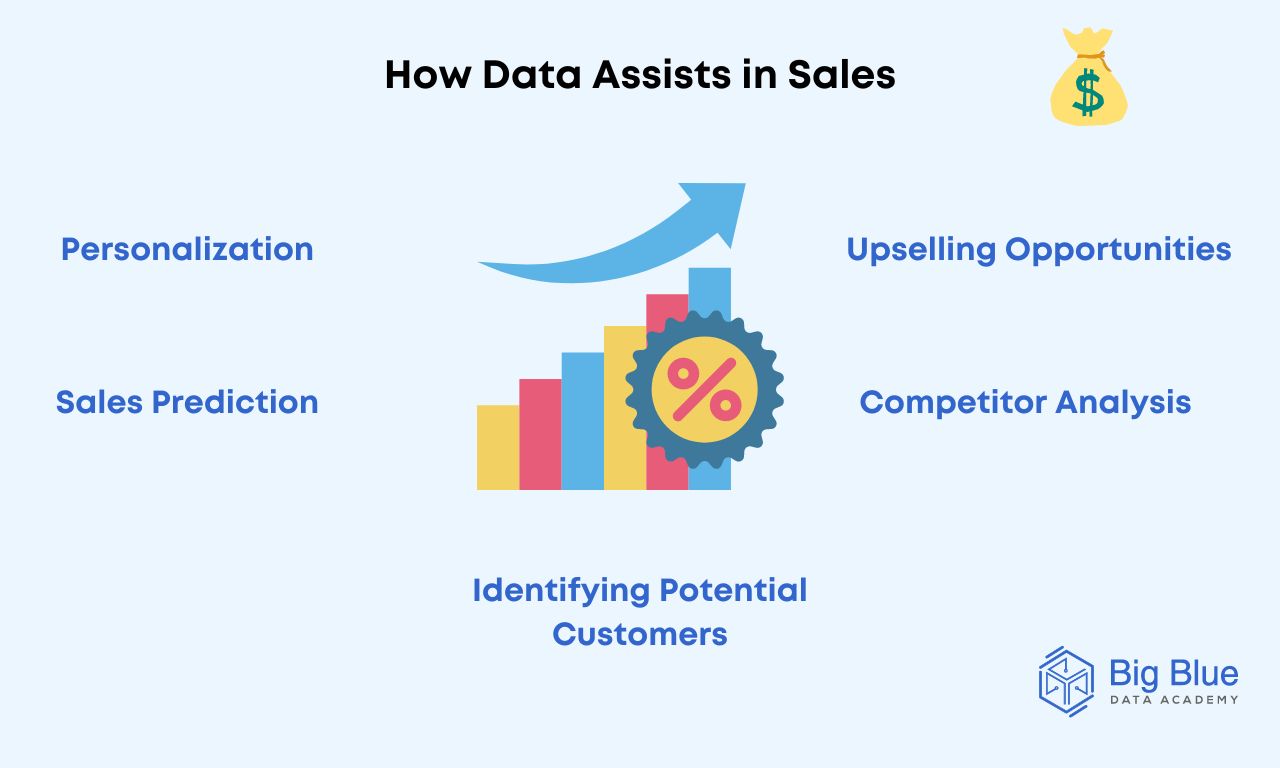How Data Transforms the Sales Landscape (2023)
Data plays a critical role across various sectors, including sales.
Data has fundamentally transformed this field as well as the strategies employed by today's businesses when making crucial business decisions.
So, in this article, we will delve into:
How data assists in sales
Types of data a sales team needs to monitor
How businesses can create a sales data-driven strategy
Let's get into it.
How Data Assists in Sales
In today's era, businesses need to make sales decisions that respond to the continuous market changes, customer preferences, and competitor activities.
Moreover, as the cost of acquiring new customers rises, sales teams within a company must judiciously allocate available resources while focusing on efforts to retain existing customers.
Let's now take a closer look at how data aids in sales.

Personalization
Personalized interactions hold significant importance in sales.
Data and their analysis allow businesses and sales teams to better understand individual customer needs, past interactions, and purchasing history.
This enables companies to offer tailored solutions and build stronger customer relationships.
Sales Prediction
Analyzing historical sales data helps identify patterns and enhances the accuracy of predicting future sales.
This insight assists sales teams in setting realistic and achievable goals, methodically allocating resources, and making necessary adjustments to meet performance objectives.
Upselling Opportunities
Data further aids sales teams in identifying upselling and cross-selling opportunities among existing customers.
By understanding customer needs, purchasing habits, and preferences, companies can recommend complementary products or services, thereby increasing revenue.
Competitor Analysis
Data also contributes to competitor analysis by providing critical information about market trends, competitors' strengths and weaknesses.
Leveraging this information, sales teams can gain a competitive advantage and differentiate themselves in the market.
Identifying Potential Customers
Data significantly contributes to identifying potential customers and efficiently evaluating them based on specific criteria.
This empowers sales teams to prioritize potential customers with the highest conversion probability, saving time and resources.
Moving forward, let's explore the types of data a sales team needs to monitor.
Types of Data a Sales Team Needs to Monitor
As previously mentioned, data offers sales teams the ability to make informed decisions and adapt their strategies accordingly.
A sales team, particularly aided by a market analyst, is required to collect and analyze data based on key performance indicators (KPIs).
Some of the fundamental KPIs and data types to be collected and analyzed include:
- Total revenue generated by the sales team
- Total sales over time to track performance trends
- Revenue per sale, indicating earnings from each transaction
- Sales by lead source, revealing where sales originate
- Percentage of revenue from existing customers (e.g., cross-selling, upselling, repeat orders)
Let's continue.
How Businesses Can Create a Sales Data-Driven Strategy
Businesses can create a data-driven strategy using the following approaches:
Aligning Goals with Sales Data
Given the volume of data, it's crucial to define specific business goals, identify relevant measurements to achieve these goals, and visualize data to present to decision-makers.
Detailed Customer Profiling
Data offers essential insights into customer behavior, preferences, and purchasing patterns.
By analyzing data, businesses can create detailed buyer personas, enabling personalized sales approaches.
Continuous Monitoring and Performance Analysis
Sales teams need to identify areas for improvement, such as bottlenecks in the sales process or underperforming segments.
Utilizing tools like Business Intelligence (BI) and Machine Learning can guide sales efforts and reshape strategies.
A key example is the case of the Harley-Davidson motorcycle dealership, which, utilizing the power of artificial intelligence, managed to increase new sales by almost 3,000%.
Ramping Up
In summary, we've explored how data assists in sales, the key data types to monitor, and how businesses can formulate a data-driven sales strategy.
The field of data analysis presents numerous career opportunities, making it a valuable skill in today's business landscape.
If you are intrigued and want to learn more about data science and data analytics, follow us for more educational articles!


